Appeals Court Upholds Ruling Barring Emergency Funding For Trump’s Border Wall
Another court loss for Trump and his border wall.
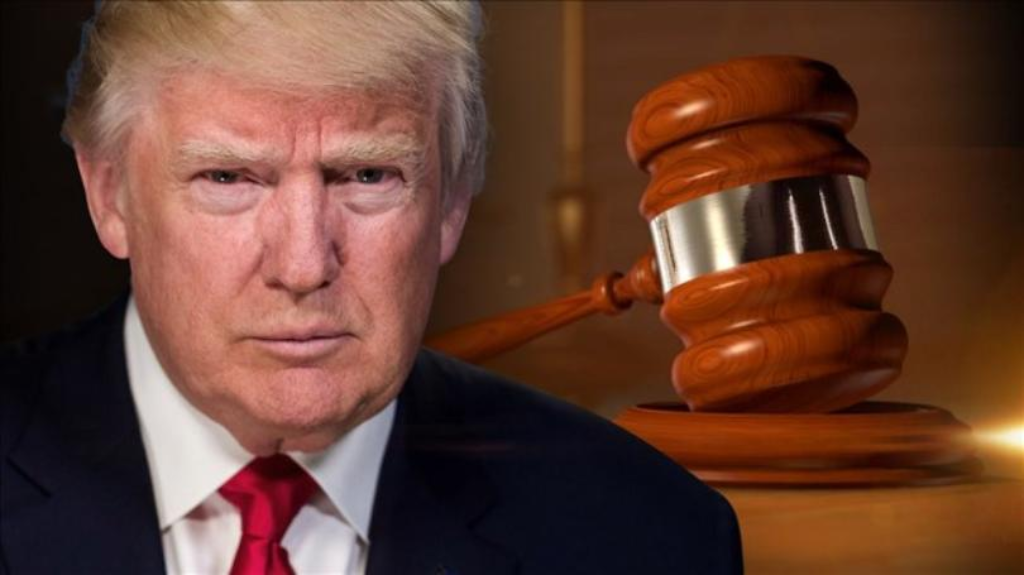
The Ninth Circuit Court of Appeals has handed the Trump Administration another court defeat, this time barring the implementation of yet another Trump Administration policy, this time targeting the President’s decision to override the will Congress regarding spending money on his border wall:
WASHINGTON — A federal appeals court in San Francisco on Wednesday upheld a block on President Trump’s attempt to use $2.5 billion from the Department of Defense to construct a wall along the southwestern border, impeding the delivery of one of his signature campaign promises.
The divided three-judge panel in the Ninth Circuit agreed with a lower court’s decision from Friday that ruled the Trump administration did not have the authority to reallocate the funds without congressional approval. The administration immediately appealed.
Two of the three judges on the panel affirmed that the administration could not build the barriers during future challenges.
“We conclude that it is best served by respecting the Constitution’s assignment of the power of the purse to Congress, and by deferring to Congress’s understanding of the public interest as reflected in its repeated denial of more funding for border barrier construction,” wrote Judges Michelle Friedland, an Obama appointee, and Richard Clifton, a George W. Bush appointee.
Judge N. Randy Smith, also a Bush appointee, dissented, calling the ruling “an uncharted and risky approach.”
“This approach is in contradiction to the most fundamental concepts of judicial review,” Judge Smith said. “The majority has created a constitutional issue where none previously existed.”
The White House did not immediately respond to a request for comment Wednesday.
The American Civil Liberties Union, which filed a lawsuit on behalf of the Sierra Club, hailed the freezing of the funds as a victory.
“Congress and now two courts have said no to border wall funds,” Dror Ladin, a staff attorney with the A.C.L.U., said in a statement Friday. “For the sake of our democracy and border communities, it’s time the president come to terms with the fact that America rejected his xenophobic wall — and move on.”
All of this, of course, is rooted in the “national emergency” that President Trump declared in late February at the same time that he signed off on the budget deal reached by the House and Senate. That deal, of course, did not include significant funding for the President’s border wall, something that had been the main issue of contention during the thirty-five-day government shutdown that lasted from December 22nd to January 25th. The President declared this emergency by relying on the authority granted to him under the National Emergencies Act of 1976, which has been used by Presidents in the past but never in the manner that Trump used it to provide funding to a project that had been specifically denied by Congress. Indeed, the President seemed to undermine his own case for a “national emergency” at the news conference where he announced it when he admitted that he “did not need to do this.” Specifically, the President admitted that he could have waited for additional funding from Congress but that he wanted to speed the project along. This admission is an obviously damaging admission on the part of the President because it suggests that there is no “national emergency” and that Trump was merely using the alleged authority the law provides to him to get around the political process that the Constitution contemplates.
In addition to these rulings, Congress also sought to block the President’s declaration of a “national emergency” through the procedures allowed by the 1976 law. Within days after the President had made his declaration, the Democratic-controlled House of Representatives began considering a resolution designed to halt that declaration. That resolution was approved by the House and Senate but vetoed by the President, and Congress unsurprisingly failed to override that veto. Despite that veto, though, it was notable that at least in the Senate the vote against the President’s declaration was bipartisan in some sense, with six Republicans joining in with the Democrats in favor of the resolution. Unfortunately, the number of Republicans in the House who did the same as relatively small.
The case that the Ninth Circuit ruled on arises out of the case filed in the Northern District of California, where Judge Haywood S. Gilliam Jr. relied in no small part on the President’s aforementioned admission that he did not need to declare an emergency and that he did so mainly because he wanted to speed up the process and get money for his border wall that Congress did not authorize. Based on this, Judge Gilliam determined that the President had acted beyond the scope of the authority allowed to him by the law. The ruling is significant in that, in the past, courts had only given cursory examination to the justification for a President’s declaration of an emergency, a position that of course gave the Chief Executive wide latitude in both determining when a “national emergency” exists and what the law authorizes him to do after declaring such an emergency. The majority of the three-judge panel accepted Judge Gilliam’s reasoning in that part of his opinion.
In addition to that, the panel majority also ruled that the President’s action had violated the Separation of Powers in seeking to use his “emergency” authority to get around Congressional authority to chose to authorize, or not authorize, requested Executive Branch expenditures. As both the panel majority and Judge Gilliam put it, while there are some circumstances where Federal law allows the President to use funds designated for one purpose to fund something else, there are usually strict statutory limits on how or when that can be done. In this case, the President purported to use his declaration of a national emergency at the border to divert certain Defense Department spending to his border wall. This was clearly not authorized by law. This, combined with the fact that the destination of the funding in question was for a project that had been specifically denied by Congress, was sufficient basis upon which to conclude that the President had exceeded his authority under the law.
From here, the Trump Administration’s options are familiar ones. It can seek to have Judge Gilliam’s injunction reviewed by the Ninth Circuit sitting en banc, which seems unlikely to result in a different outcome, or it can seek to have the stay lifted by the Supreme Court. While the Court is currently out of session, applications of this type can be made to the Court and it will typically be up to the Justice assigned to the Ninth Circuit, currently Associate Justice Elena Kagan, to either rule on the matter or submit it to her fellow Justices for review. How long it might take the Justices to rule on the matter over the summer is anyone’s guess, and in the meantime, the injunction against using the diverted funds for the border wall will remain in effect.
Here’s the opinion:
Sierra Club Et Al v. Trump … by on Scribd

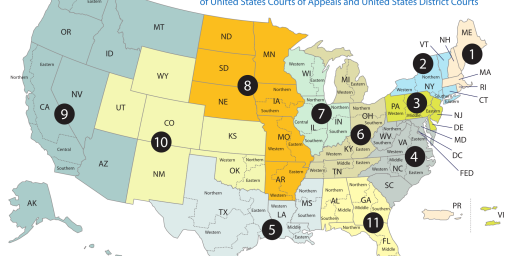
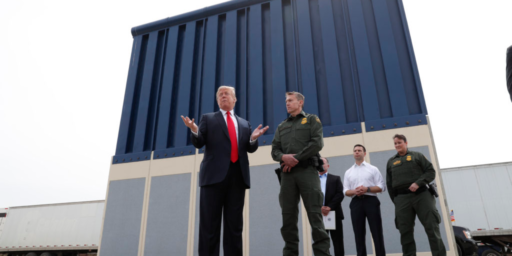
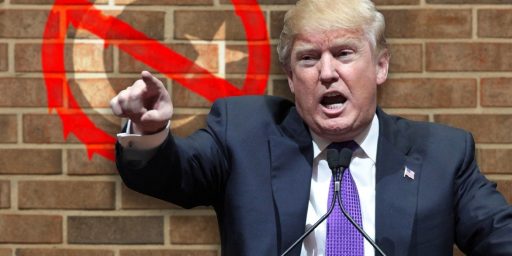
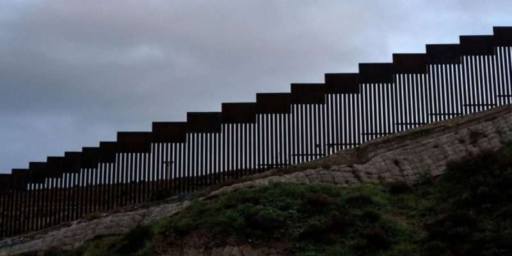

Poor Cheeto. I feel so bad for him, it’s all I can do not to burst out laughing.
So much winning…
Whining…
Whatever.